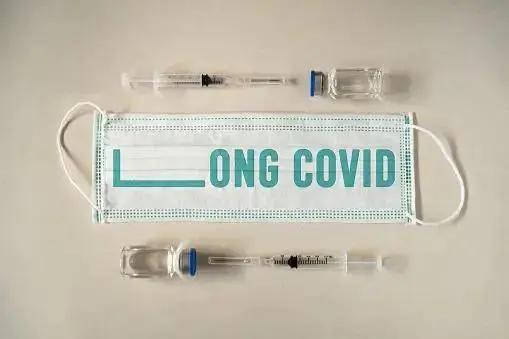Long COVID mask and COVID-19 vaccines.
Image credits: Unsplash

New research suggests a potential link between impaired lung function and cognitive difficulties, such as brain fog, in patients with Long COVID. Presented at the annual meeting of the Radiological Society of North America (RSNA), the study found that lower pulmonary gas exchange in Long COVID patients may be associated with cognitive dysfunction, including trouble concentrating and memory issues.1
The study linked lower gas exchange to cognitive impairments, as well as reductions in gray and white matter volumes in the brain. Increased cerebral blood flow was also observed, possibly serving as a compensatory response to impaired lung function. Cognitive difficulties varied among participants, with some experiencing mild issues, while others reported more significant challenges such as slow thinking and trouble focusing.1
This study is the first to use advanced MRI techniques to assess lung and brain function simultaneously in Long COVID patients. Pulmonary MRI using hyperpolarized xenon (129Xe) allowed for more sensitive measurements of gas exchange than standard pulmonary function tests.1
“These findings suggest a potential causative link between lung dysfunction and cognitive dysfunction in Long COVID,” said Sean B.Fain, PhD, senior study author. “This could inform treatment strategies targeting improved lung function to help mitigate cognitive symptoms.”1
The study included 12 patients (median age 59) with persistent fatigue and shortness of breath after recovering from acute COVID-19. The researchers found that decreased gas exchange was linked to cognitive impairments and structural brain changes, suggesting that poor lung function may exacerbate brain fog and other cognitive issues in Long COVID patients. Further research is needed to confirm these results and explore whether improving pulmonary function can help alleviate cognitive symptoms.1
According to the CDC, Long COVID is a chronic condition that persists for at least three months after a SARS-CoV-2 infection, affecting multiple organ systems and causing significant healthcare burdens. In 2022, the CDC reported that 6.9% of adults and 1.3% of children in the US had experienced Long COVID, with higher risks among certain groups, such as women and those with underlying health conditions.2 According to this more recent study and the National Center for Health Statistics, approximately 17.6% of adults in the US have experienced Long COVID.1
The CDC emphasizes that COVID-19 vaccination remains the most effective tool to reduce the risk of developing Long COVID, with research showing it lowers the likelihood of the condition in adults and children. Public health efforts are focused on increasing awareness, combating stigma, and providing clinicians with resources to manage Long COVID.
In a recent roundtable discussion hosted by ContagionLive and NeurologyLive, we brought experts together and explored the significant cognitive impacts of Long COVID, particularly brain fog and IQ decline. Svetlana Blitshteyn, MD, FAAN, a neurologist at the University at Buffalo, emphasized the gravity of these effects, “Even when you feel well and think you’re fully recovered, just the fact that you had an infection may worsen your cognitive state, and that is very important.” Studies have shown that even mild COVID-19 can result in measurable cognitive decline, with some patients experiencing a 3-point IQ drop, and those with severe cases or prolonged symptoms seeing up to a 9-point decrease.3
Long COVID experts also noted the potential long-term impact on cognitive health, with some studies showing cognitive decline in older adults, raising concerns about future dementia risks. Clinicians are particularly worried about the effects of repeated infections, as reinfections could lead to even greater cognitive decline.3
What You Need To Know
Lower pulmonary gas exchange in Long COVID patients is linked to cognitive impairments, including trouble concentrating and memory loss.
The study found structural brain changes, including reduced gray and white matter volumes, potentially related to impaired lung function.
The research suggests that targeting lung function improvement could help mitigate cognitive difficulties in Long COVID patients.
“There’s a real concern about the long-term effects of COVID on brain health, especially as we see recurrent infections,” Blitshteyn added. “This poses a significant public health issue, particularly as the population ages.”3
Experts agreed that the ongoing risk of Long COVID, and the absence of effective preventative measures underscored the need for continued vigilance in COVID-19 prevention and mitigation strategies. The impact on cognitive health is just one aspect of the broader public health challenges posed by Long COVID.3
In conclusion, the study found that lower pulmonary gas exchange was associated with cognitive impairments and structural brain changes, including reduced gray and white matter volumes. Increased cerebral blood flow may serve as a compensatory response to lung dysfunction. These findings suggest that improving lung function could help mitigate cognitive symptoms in Long COVID patients, emphasizing the need for further research to develop targeted treatments for the condition’s physical and cognitive aspects.
Tune into all 5 episodes of our Long COVID roundtable discussion to learn the ins and outs of Long COVID: A Deep Dive: Understanding the Neurological Toll of Long COVID









wwuhcj